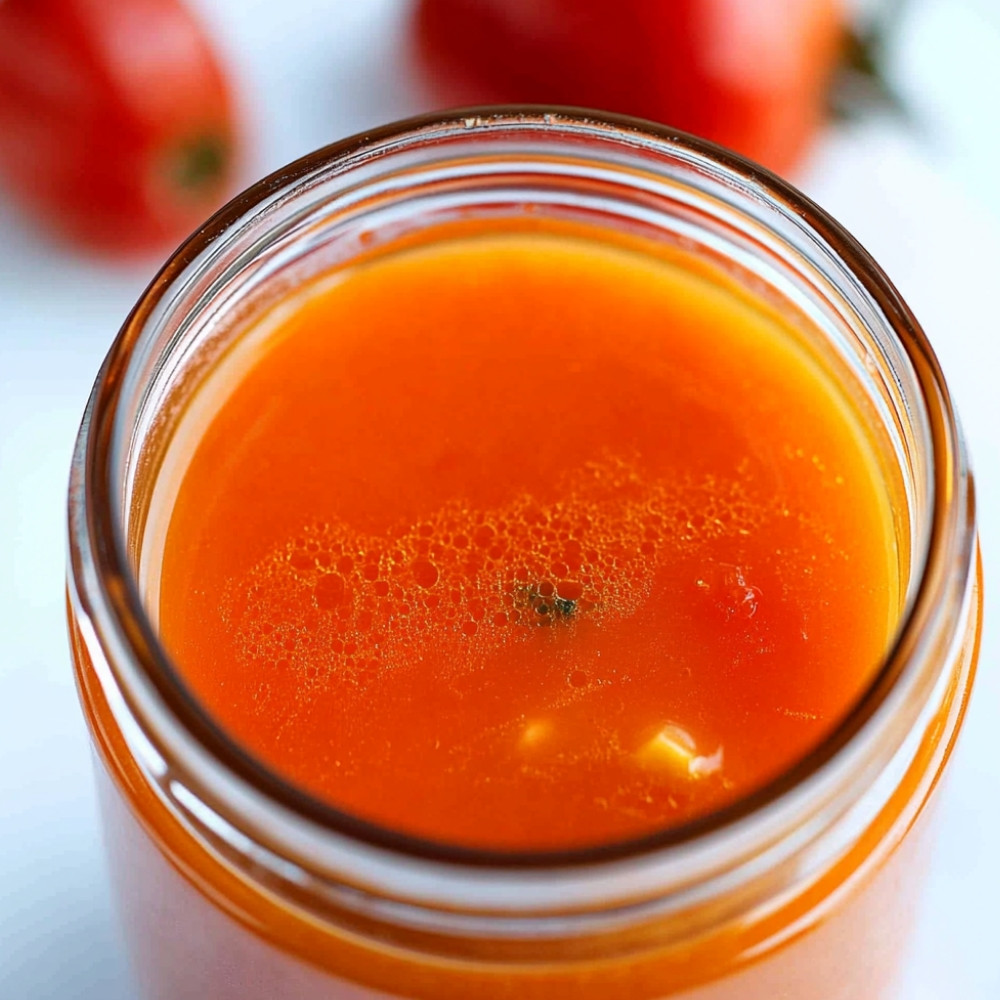Deliciously Simple Tomato Broth for Any Meal
“`html
Oh, where do I start with this tomato broth? It’s just… it’s like a warm hug in a bowl! I mean, nothing beats that rich, comforting aroma that fills your kitchen when it’s simmering away. And the best part? You can whip this up in no time. Picture fresh, juicy tomatoes mingling with garlic and herbs, just waiting to become this vibrant, tasty base for all kinds of dishes. It truly doesn’t get much better than this, I promise.
Why You’ll Crave It
- It’s super versatile—you can use it in soups, stews, or even drink it straight!
- The flavors… oh my, they deepen so beautifully as it simmers. You won’t want to stop tasting!
- Healthier than store-bought versions, and you control the ingredients, which is always a bonus.
- It’s a great way to use up those tomatoes sitting on your counter… you know the ones!
- Perfect for batch cooking, so you can savor some now and freeze some for later.
My family fights over the last bowl of this broth… seriously, it’s a thing!
What You’ll Need
- Olive oil: A couple tablespoons to get things going, rich and flavorful.
- Medium onion: Just one, chopped. It brings such a lovely sweetness.
- Garlic cloves: Two, minced, because garlic makes everything better.
- Ripe tomatoes: About six cups, chopped. Fresh is ideal, but canned works too!
- Vegetable or chicken broth: Four cups to add that depth we crave. Use low-sodium if you can.
- Salt: One teaspoon, to taste.
- Black pepper: Half a teaspoon—freshly cracked if you have it.
- Sugar: A teaspoon, totally optional, but if your tomatoes are too acidic it helps.
- Fresh herbs: Basil or parsley, whatever you like, for a fragrant finish.
Easy How-To
Get Cooking!
Alright, so first off, you’ll want to wash and roughly chop those tomatoes, onion, and garlic… Don’t worry about making them pretty—just think rustic! Toss them into a big pot with the olive oil over medium heat. Once it’s hot, add the onions and let them soften up for about five minutes. Oh, the aroma already! Next, toss in the minced garlic and let it mingle for a minute. Now… add the chopped tomatoes to the party! Pour in your broth, sprinkle that salt, pepper, and sugar. Stir it all together like a warm hug in the pot.
Bring it to a boil, and then lower that heat to a gentle simmer. Let it bubble away for about 30 to 40 minutes, uncovered, so all those flavors can really come together—just keep an eye on it, okay? After it’s done, strain that broth through a fine-mesh sieve or cheesecloth into another pot or bowl. Press down on those solids to get every last drop of flavor! Then taste it… and adjust that seasoning if needed.
Good to Know
- If you want a heartier flavor, feel free to toss in a bay leaf or some thyme while it simmers.
- Don’t throw away those strained solids—add them to a compost pile if you’re into that.
- This broth is so good, you might want to whip up a double batch for future meals!
Serving Ideas
- Serve it warm with a drizzle of olive oil and a sprinkle of fresh herbs, and maybe a nice piece of crusty bread.
Top Tricks
- For a richer broth, roast the tomatoes in the oven before adding them to the pot… trust me on this!
Frequently Asked Questions
What type of tomatoes are best for making tomato broth?
Really, ripe, juicy tomatoes are your best bet, like Roma or vine-ripened varieties. They have such a fantastic flavor!
Can I use canned tomatoes instead of fresh?
Sure thing! Canned tomatoes are often picked at peak ripeness and work like a charm for this broth.
How long should I simmer the broth?
At least 30 minutes is ideal, but hey, longer won’t hurt—more flavor is always a good idea!
Can I store leftover tomato broth?
Absolutely! You can keep it in the fridge for up to a week or freeze it for several months. Just make sure to label those containers!
What are some ways to use tomato broth?
The possibilities are endless! Use it as a base for soups, stews, risottos, or even to cook grains. It adds a lovely depth to anything.
Conclusion
This deliciously simple tomato broth is truly a little work of magic in the kitchen. It’s such a versatile base, enhancing everything from soups to pastas, and it’s comforting enough to sip on its own. By using fresh, quality ingredients, you really elevate your meals. So go ahead, give it a try—you’ll see why I keep coming back for more!
More Recipe Suggestions and Combinations
Tomato Basil Soup
Combine the broth with fresh basil and a splash of cream for a delightful tomato basil soup.
Pasta Primavera
Use the broth as the cooking liquid for pasta, adding seasonal veggies for a light primavera dish.
Vegetable Risotto
Mix it into risotto for yummy flavor that pairs beautifully with mushrooms and asparagus.
Chickpea Stew
Combine it with chickpeas, spinach, and spices for a hearty, nutritious meal.
Rice Pilaf
Cook rice in the broth instead of water for a savory dish that goes perfectly with grilled meats.
Shakshuka
Simmer eggs in the tomato broth with garlic and cumin for a spicy breakfast dream.
Couscous Salad
Cook couscous with the broth and toss it with grilled veggies and feta for a refreshing side.
“`







